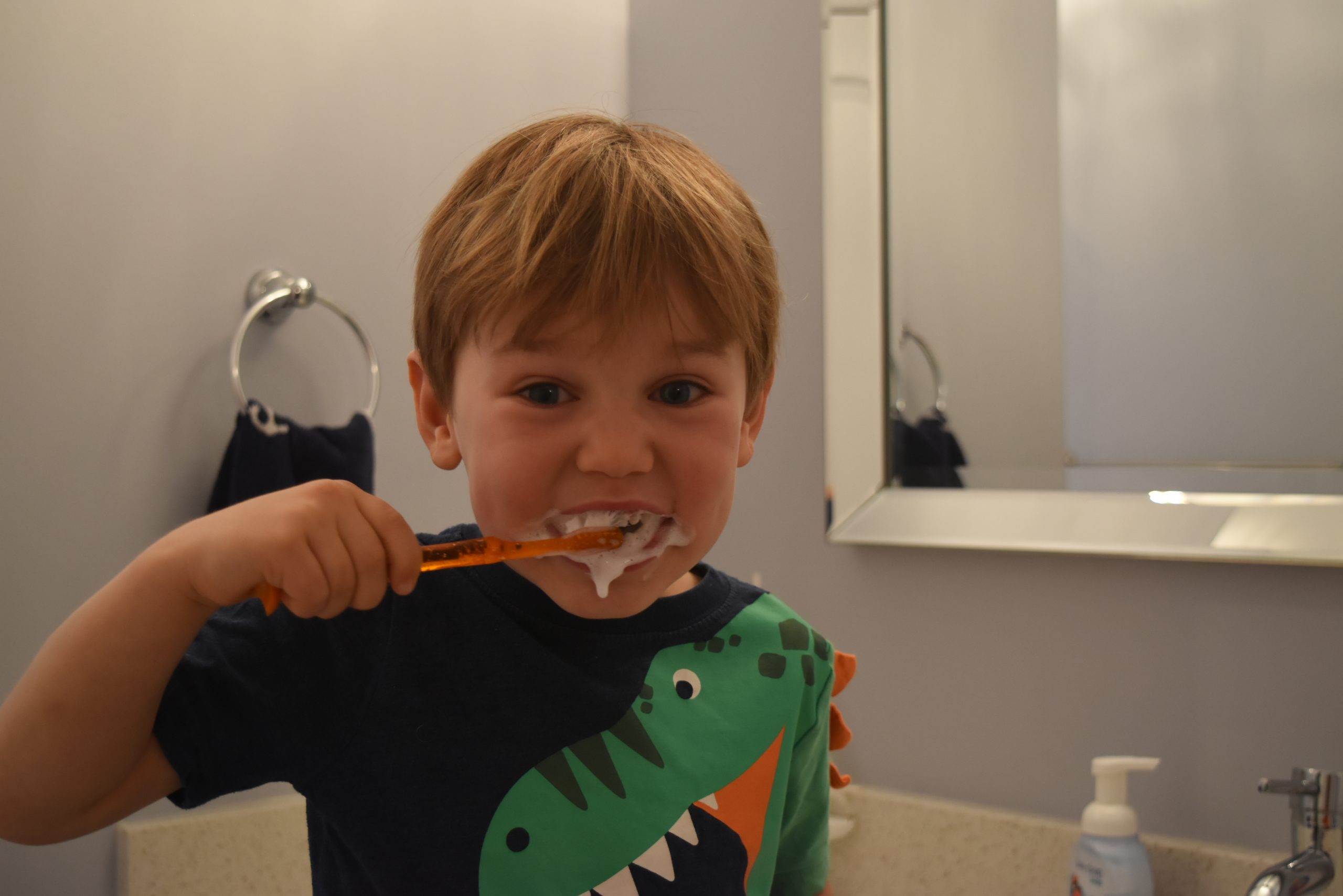
The subtle difference between cleaning the house versus your little one brushing their teeth

What’s the difference between telling a child to wash the dishes versus washing their face?
Or what’s the difference between telling them to set the table versus packing their lunchbox?
Some are household chores while others are self-care practices.
It’s important to consider this subtle yet important difference because children may be proficient with some tasks while struggling with others.
Additionally, the motivations and benefits associated with chores vs self-care habits differ. This piece will examine these differences in further detail.
Defining the Difference Between Kids’ Chores & Self-Care Habits
Almost all of the tasks parents assign to their kids can be grouped into these two categories. We can define them in the following ways:
- Chores: These are tasks assigned to an individual (ie. your child) that benefits the family as a whole after they have been completed.
- Self-Care: These are tasks or personal responsibilities that benefit the individual who practices them.
The difference, although subtle, is important because of their focus.
Chores are outwardly focused and benefit the entire household. Contrarily, self-care is inwardly focused and mainly benefits your child.
But that doesn’t mean household chores don’t have personal benefits and that self-care habits doesn’t benefit other family members.
Kids who complete chores for the family will learn new skills that will stick with them into adulthood. Also, when kids maintain their self-care routines, better hygiene and cleanliness will contribute to the health of their family members.
Why the Distinction Matters
The distinction between chores and self-care matters because the differences in these tasks impact child development differently.
Chores and self-care habits develop different things. The chores help kids build their housekeeping skills while the self-care routines help them establish habits for the upkeep of their health as adults.
Ultimately, you want your child to develop into a well-rounded individual.
That means a child who is equipped with housekeeping skills for their own independence and personal care skills for their health and wellbeing will have harmony. Plus, they will also understand how helping themselves can help them stay helpful to others.
The takeaway message here is that you should assign your kids a reasonable balance of both tasks.
Don’t let them get away with taking care of just themselves while you do all the work around the house. And see to it that they develop a routine of caring for themselves without constant reminders.
The difference
To further illustrate, here is a list of chores versus a list of self-care habits:
List of Chores for Kids
- clean their room
- care for the family pet
- cash the dishes
- do their laundry
- put their cup/dish in the sink or dishwasher when they are done
- set/clear the table
- water the plants
- take out the trash
List of Self-Care Habits for Kids
- brush their teeth
- comb their hair
- make their bed
- take a bath/shower
- complete their homework
- do their laundry
- practice their musical instrument/sport
- empty their backpack when they get home and put things where they belong
Benefits of Integrating Both Kids’ Chores & Self-Care Habits
As we mentioned above, assigning your kids chores and personal responsibilities together will help them grow into well-rounded young adults.
It will also encourage the full development of your child across the spectrum from the physical to emotional.
The Upsides of Chores for Kids & Self-Care
- Build motor skills & muscle coordination – Most chores require kids to exercise their manual dexterity (ie. use their hands and fingers) and muscle strength/endurance since they may have to lift, pull and push objects.
- When they get in the habit of using their bodies to complete chores, they will build strength, endurance and coordination and will find such activities less physically demanding over time.
- Brain & cognitive improvements – Many chores and self-care practices require kids to set goals, manage their time, improve their verbal and spatial reasoning and more.
- When children develop these skill sets early in life, they will have an easier time juggling the greater cognitive demands placed on them in high school, college/university and in the workplace.
- Establishing healthy habits for adulthood – Although it’s true that it’s never too late to learn something new, the time constraints of adulthood make learning new things more challenging. Kids who embrace chores and self-care early in life will find it easier to maintain healthy habits in adulthood.
- Emotional intelligence – The act of completing tasks, especially chores for a household, means keeping the home clean and tidy for others. This is an end goal that’s rooted in empathy.
A Chore Chart Can Help Your Kids Stay On Top of Both
It can feel overwhelming at times for you and your kids to stay on top of their weekly responsibilities. A helpful way to simplify their routine is to use a chore chart.
Chore charts for kids allow them to visualize their assigned tasks, plan them, and track them as they are completed.
You can use a chore chart to plan for household chores and self-care practices in different ways.
For example, you can assign self-care practices on a daily basis (ie. tooth brushing, showering), and household chores on a weekly basis (ie. doing laundry on Saturdays, dishwashing on Sundays).
There are different ways to integrate both types of chores, and you’ll have to use your discretion when assigning them. But what matters most is that your kids are helping to take care of the home and themselves.
My Starry Chart is the perfect way to meet this balance.
A fun, visual way to assign chores, while also providing a visual way to organize when chores and self-care items are completed. One single place for your child to track both types of responsibilities. It will help them see how they are engaged. And perhaps even make them feel relieved that something like this exists to help keep it organized.
